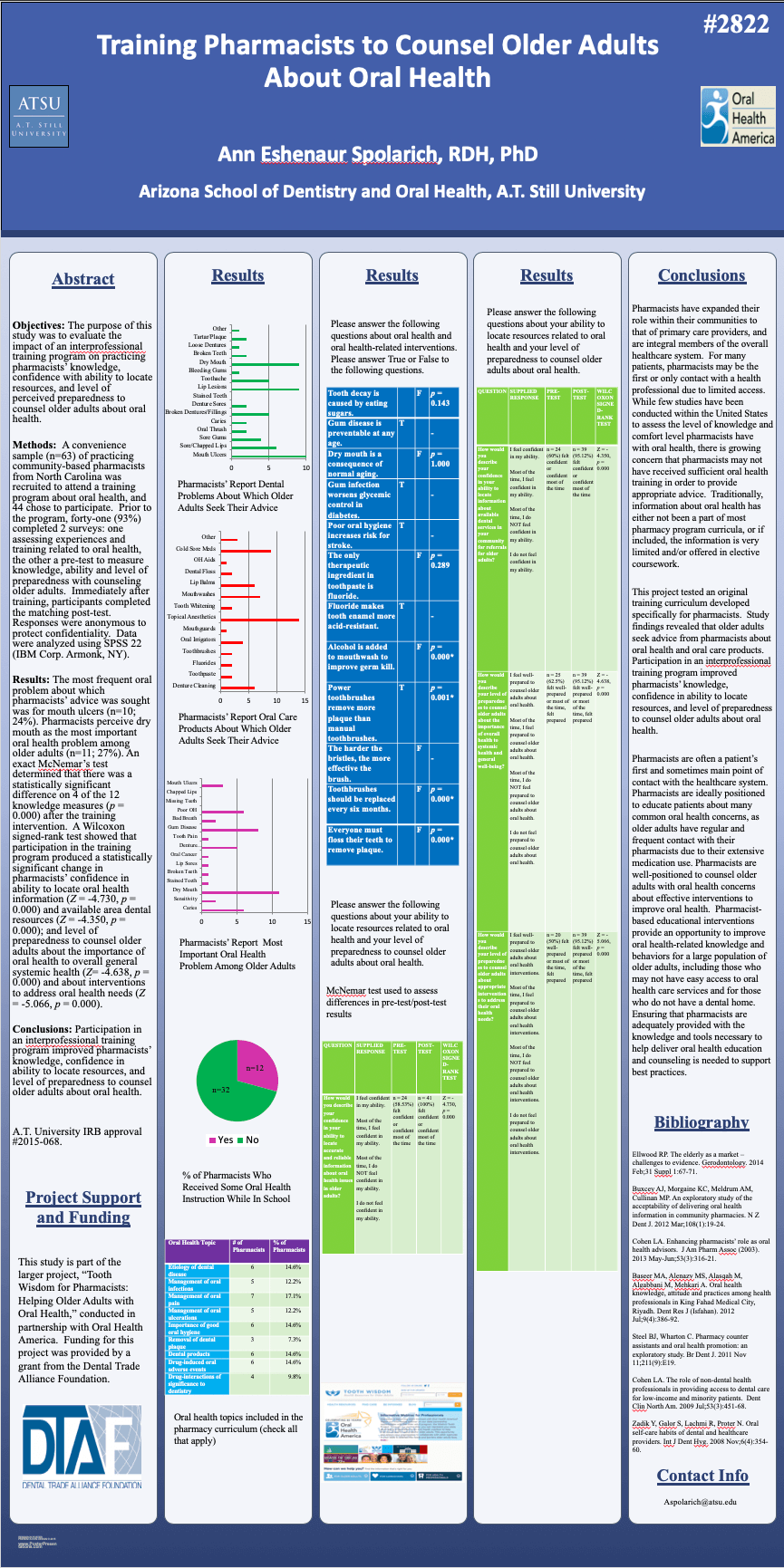Train Pharmacists to Counsel Older Adults About Oral Health
Contributors:
Ann Eshenaur Spolarich, RDH, PhD
Ann Eshenaur Spolarich, RDH, PhD
Participating Organizations:
Arizona School of Dentistry and Oral Health
Arizona School of Dentistry and Oral Health
Objectives
The purpose of this study was to evaluate the impact of an interprofessional training program on practicing pharmacists’ knowledge, confidence with ability to locate resources, and level of perceived preparedness to counsel older adults about oral health.
The purpose of this study was to evaluate the impact of an interprofessional training program on practicing pharmacists’ knowledge, confidence with ability to locate resources, and level of perceived preparedness to counsel older adults about oral health.
Methods
A convenience sample (n=63) of practicing community-based pharmacists from North Carolina was recruited to attend a training program about oral health, and 44 chose to participate. Prior to the program, forty-one (93%) completed 2 surveys: one assessing experiences and training related to oral health, the other a pre-test to measure knowledge, ability and level of preparedness with counseling older adults. Immediately after training, participants completed the matching post-test. Responses were anonymous to protect confidentiality. Data were analyzed using SPSS 22 (IBM Corp. Armonk, NY).
A convenience sample (n=63) of practicing community-based pharmacists from North Carolina was recruited to attend a training program about oral health, and 44 chose to participate. Prior to the program, forty-one (93%) completed 2 surveys: one assessing experiences and training related to oral health, the other a pre-test to measure knowledge, ability and level of preparedness with counseling older adults. Immediately after training, participants completed the matching post-test. Responses were anonymous to protect confidentiality. Data were analyzed using SPSS 22 (IBM Corp. Armonk, NY).
Results
The most frequent oral problem about which pharmacists’ advice was sought was for mouth ulcers (n=10; 24%). Pharmacists perceive dry mouth as the most important oral health problem among older adults (n=11; 27%). An exact McNemar’s test determined that there was a statistically significant difference on 4 of the 12 knowledge measures (p = 0.000) after the training intervention. A Wilcoxon signed-rank test showed that participation in the training program produced a statistically significant change in pharmacists’ confidence in ability to locate oral health information (Z = -4.730, p = 0.000) and available area dental resources (Z = -4.350, p = 0.000); and level of preparedness to counsel older adults about the importance of oral health to overall general systemic health (Z= -4.638, p = 0.000) and about interventions to address oral health needs (Z = -5.066, p = 0.000).
The most frequent oral problem about which pharmacists’ advice was sought was for mouth ulcers (n=10; 24%). Pharmacists perceive dry mouth as the most important oral health problem among older adults (n=11; 27%). An exact McNemar’s test determined that there was a statistically significant difference on 4 of the 12 knowledge measures (p = 0.000) after the training intervention. A Wilcoxon signed-rank test showed that participation in the training program produced a statistically significant change in pharmacists’ confidence in ability to locate oral health information (Z = -4.730, p = 0.000) and available area dental resources (Z = -4.350, p = 0.000); and level of preparedness to counsel older adults about the importance of oral health to overall general systemic health (Z= -4.638, p = 0.000) and about interventions to address oral health needs (Z = -5.066, p = 0.000).
